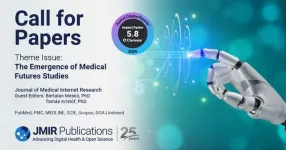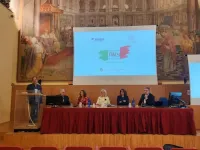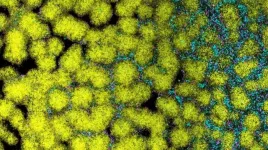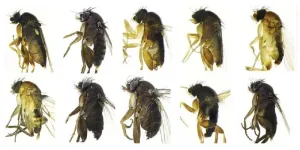(Press-News.org) (Toronto, October 17, 2024) JMIR Publications invites submissions to a new theme issue titled “The Emergence of Medical Futures Studies” in the Journal of Medical Internet Research, the leading peer-reviewed journal for digital medicine and health and health care in the Internet age, indexed in PubMed, PMC, MEDLINE, SCIE, Scopus and DOAJ.
The rapid progress of technology in health care, combined with significant cultural shifts toward digital health and the urgent need for preparedness, highlighted by events such as the COVID-19 pandemic and climate change, have brought about an increased emphasis on the future of medicine and health care within medical journals and the life science community.
This call for papers aims to shift the paradigm: traditionally, medical and health care–focused journals have featured insights and opinions about the future from professors and key opinion leaders who often do not utilize futures methods that have been widely accepted in economics and business management for over four decades.
Traditional or past approaches are insufficient to address these challenges and take advantage of opportunities, necessitating the adoption of futures research methods and tools to navigate the evolving landscape effectively.
This theme issue seeks to popularize these methodologies and provide comprehensive guidelines for their application empowering a broader range of voices to contribute informed, methodically sound visions of the future in medicine and health care.
Despite the demonstrated effectiveness of foresight applications in diverse fields like national strategies, policy development, and global threat preparedness, their utilization in health care remains limited. Of the more than 50 available futures methods, only 8 are currently employed in this sector, indicating a significant underutilization of foresight's potential in health care [1]. By integrating these futures methods into health care planning and decision-making, we could identify emerging trends, mitigate risks, and capitalize on new opportunities, ultimately leading to the potential of better health outcomes.
This underutilization presents a compelling case for establishing medical futures studies as a distinct scientific subfield. This subfield would concentrate on analyzing emerging technological trends, assessing policy implications, and proactively anticipating and mitigating potential challenges in health care. To cultivate a new research community in this vital area, this call for papers and theme issue is dedicated to medical futures studies.
This call for papers aims to gather contributions that will deepen the interdisciplinary dialog, promote democratic participation—including from patient scholars—and help shape alternative futures in medical science. The future of health care depends on the collaboration between medical professionals, technologists, and futurists. This approach will enable us to address complex challenges and drive innovation in the field.
Papers submitted to the theme issue for consideration may explore, but are not limited to, the following topics (sample titles):
The history and future of using futures methods in medicine and health care
Specific examples and case studies of using futures methods in these domains
The role of specific futures methods, like the Delphi method and scenario planning, in preparing health care systems for pandemics and other global health emergencies
Exploring how horizon scanning can aid in the early detection and development of new medical treatments and technologies
Application of futures methods to explore the impacts of AI integration into medicine
For more information, please visit the Journal of Medical Internet Research website.
References
[1] Meskó B, Kristóf T, Dhunnoo P, Árvai N, Katonai G Exploring the Need for Medical Futures Studies: Insights from a Scoping Review of Healthcare Foresight. J Med Internet Res 2024; 26. doi:10.2196/57148. http://dx.doi.org/10.2196/57148
About JMIR Publications:
JMIR Publications, celebrating its 25th anniversary in 2024, is a leading open access digital health research publisher. As a pioneer in open access publishing, JMIR Publications is committed to driving innovation in scholarly communications, advancing digital health research, and promoting open science principles. Our portfolio features 35 open access, peer-reviewed journals dedicated to the dissemination of high-quality research in the field of digital health, including the Journal of Medical Internet Research, as well as cross-disciplinary journals such as JMIR Research Protocols and the new title JMIR XR & Spatial Computing.
END
The Journal of Medical Internet Research theme issue call for papers: The emergence of medical futures studies
2024-10-17
ELSE PRESS RELEASES FROM THIS DATE:
License to chill: Bond shows ‘regressive nostalgia’ can freeze a brand's future
2024-10-17
Super-spy James Bond is a prime example of ‘regressive nostalgia’ highlighting how certain consumer groups cling to idealised past versions of brands and resist attempts to move with the times, a new study reveals.
Researchers examined the James Bond movie franchise - a cultural icon for over 70 years - and discovered that some ‘super-consumers’ react negatively to modern portrayals of the fictional British secret agent that reflect contemporary societal values.
Whilst loyal to the brand, these consumers prefer traditional, more exclusionary, versions of Bond which most closely follow author Ian Fleming’s original 1950s and 1960s vision – ...
Researchers from Brazil and Italy search industrial waste for new Alzheimer’s drugs
2024-10-17
A self-proclaimed Brazil-Italy collaboration enthusiast, researcher Laura Bolognesi created the B2AlzD2 Joint Lab at the Department of Pharmacy and Biotechnology of the Università di Bologna (UNIBO), the first Brazil-Bologna joint laboratory dedicated to the development of new drugs for the treatment of Alzheimer’s disease. The partners include scientists from four Brazilian universities: the Federal University of Rio de Janeiro (UFRJ), the University of Brasília (UnB), the University of São Paulo (USP Ribeirão Preto) and the Federal University of Minas Gerais (UFMG).
One of the laboratory’s ongoing ...
BU, Boston Medical Center researchers join forces with GSK to fight lung diseases
2024-10-17
(Boston)—Researchers from the Center for Regenerative Medicine (CReM) at Boston University and Boston Medical Center (BMC) have announced a new collaboration with the global biopharma company GSK to advance innovative research focused on developing cutting-edge models to study and treat lung diseases like pulmonary fibrosis.
Pulmonary fibrosis, including its most common form, idiopathic pulmonary fibrosis (IPF), is a progressive and life-threatening condition that results in scarring of the lungs, making it increasingly difficult for patients to breathe. ...
Bacteria thrive by playing nice before going their own way
2024-10-17
Biofilms — slimy communities of bacteria — grow on all sorts of surfaces: from glaciers and hot springs to plant roots, your bathtub and fridge, wounds, and medical devices such as catheters. Most biofilms are composed of multiple bacterial species, but how these species manage to live together is unclear.
A new study by Dartmouth scientists in Current Biology uses experiments and modeling to delve into how three species of biofilm bacteria coexist — and when they move out on their own. One species, Pseudomonas aeruginosa, a verstaile pathogen known to be antibiotic resistant, dominated ...
Identifying the genes that viruses ‘steal’ from ocean microbes
2024-10-17
COLUMBUS, Ohio – The microbes that cycle nutrients in the ocean don’t do the work on their own – the viruses that infect them also influence the process. It’s a vital job for the rest of the planet, enabling oceans to absorb half of the human-generated carbon in the atmosphere and produce half of the oxygen we breathe.
A new study gets scientists closer to more fully understanding where viruses fit into the global ocean picture of cycling nutrients such as nitrogen, phosphorous and, of particular interest, carbon. The research broadly expands on a 20-year-old finding that genes can be exchanged between viruses and the photosynthetic ...
CDC/PEPFAR awards Georgetown $27.5 million to address HIV/AIDS in Haiti
2024-10-17
WASHINGTON (Oct. 17, 2024) -- The U.S. Centers for Disease Control and Prevention (CDC) and the President’s Emergency Plan for AIDS Relief (PEPFAR), have awarded $27.5 million to the Center for Global Health Practice and Impact (CGHPI) at Georgetown University Medical Center to expand its ongoing work in Haiti to address HIV/AIDS.
For the 150,000 people in Haiti living with HIV, losing access to basic life-saving therapy can lead to unnecessary suffering, risk of transmission to others, and ...
Found hundreds of species using DNA barcoding
2024-10-17
The Earth is an almost unimaginably diverse planet in terms of species. Researchers have identified between two and three million species, but there are many more that we know nothing about.
The unknown species are called ‘biological dark matter’, borrowing a term from astrophysics.
“We want to demonstrate how we can gain a better overview of biological dark matter by using DNA barcoding,” said Associate Professor Emily Hartop.
DNA barcoding, in this case so-called ‘megabarcoding’, might sound mysterious, but it isn’t really. We will come back to that later. First, let us take a look at why ...
Unpaid caregiving is undervalued by society
2024-10-17
WASHINGTON — Americans believe volunteering to help strangers contributes more to society than providing care for family or friends, even though they contribute billions of dollars’ worth of labor in unpaid caregiving every year, according to research published by the American Psychological Association.
This perception could lead Americans of lower socioeconomic status to feel like they have less to contribute than people of higher socioeconomic status, because they often do not have the same amount of time or resources to devote to people outside of their communities.
“Over ...
AI helps to detect antibiotic resistance
2024-10-17
Researchers at the University of Zurich (UZH) have used artificial intelligence (AI) to help identify antibiotic-resistant bacteria. The team led by Adrian Egli, UZH professor at the Institute of Medical Microbiology, is the first to investigate how GPT-4, a powerful AI model developed by OpenAI, can be used to analyze antibiotic resistance.
The researchers used AI to interpret a common laboratory test known as the Kirby-Bauer disk diffusion test, which helps doctors to determine which antibiotics can or can’t fight a particular bacterial infection. Based on GPT-4, the scientists created the “EUCAST-GPT-expert”, which follows strict EUCAST ...
Scientific conference series aims to improve outcomes for diabetes, cancer and cardiovascular disease
2024-10-17
WASHINGTON—The Endocrine Society, a global organization that promotes endocrinology research and clinical practice, and Keystone Symposia, a nonprofit host of conferences and symposia on a range of life science and biomedical topics, will jointly host a series of three conferences to advance endocrine research.
The three conferences will focus on diabetes, oncology and cardiovascular disease—hormone-related conditions that have a major impact on public health. The conference series is slated to launch in late 2026 or early 2027 and will run ...




